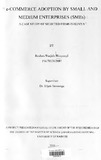E-Commerce adoption by small and medium enterprises (SMEs)A case study of selected firms in Kenya

View/
Date
2010Author
Wanyonyi, Reuben W
Type
ThesisLanguage
enMetadata
Show full item recordAbstract
According to the study conducted by the International Finance Corporation (IFC) in 2004,
Small and Medium Enterprises (SMEs) playa very important role in society; they provide
employment to over 3.2 million people and account for 18% of Kenya's Gross Domestic
Product. With the upsurge of internet and e-commerce these SMEs have the potential of
contributing more to the economic growth of this country but only if they embrace this
technology. To create a conducive environment for the growth of e-commerce the
government has implemented various initiatives like improving infrastructure and legislation.
Indeed, the challenge for SMEs is to take advantage of these initiatives and tap into ecommerce
for their continued growth.
The purpose of this study was to gain an appreciation of the extent to which SMEs have
adopted e-commerce WI h respect to using e-tools as information systems. Additionally, the
study looked at the facto that inhibit and/or facilitate e-commerce adoption as guided by the
Unified Theory of Acce tance and Use of Technology (UTAUT) model developed by
Venkatesh at el.
Using questionnaires, the study collected data from various SMEs across four major towns in
the country. Findings confirmed an impressive use of e-commerce with mobile phones and
computers being the main tools. Having been influenced by factors like peer organizations,
ease of use and performance expectation SMEs are using these tools to conduct market
research, learn, access business information as well as pay business bills and other
obligations.
Obstacles that hinder firms from usmg e-commerce range from the fact that internet is
expensive, inadequate or poor infrastructure, cyber insecurity and lack of adequate legal
environment. Among recommendations put forward to the government to address these
obstacles include speedy formulation and implementation of measures that will lower internet
bandwidth especially after commissioning of several undersea fibre cables, enhanced
infrastructure as well as firming up the legal institutions.
In conclusion, Kenya, as a country stands to gain a lot from the use of e-tools as information
systems in doing business. With small enterprises showing an impressive adoption of ecommerce,
the entire society needs to embrace this technology specially in this information
age.
111
Publisher
School of Computing and Informatics, University of Nairobi
Description
MSc
